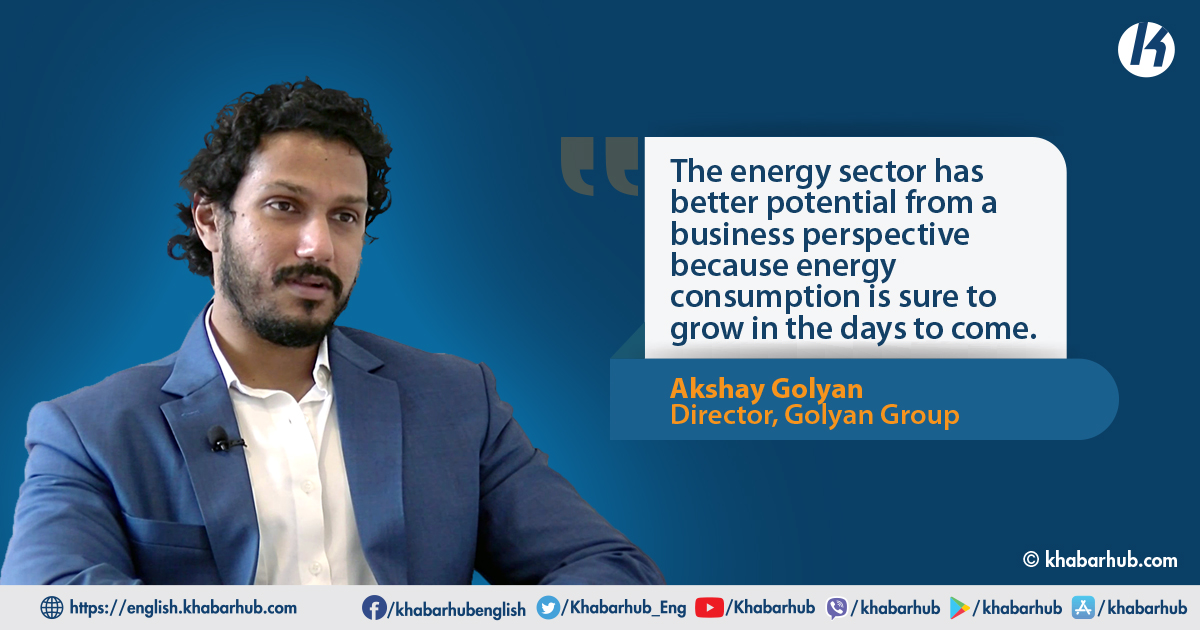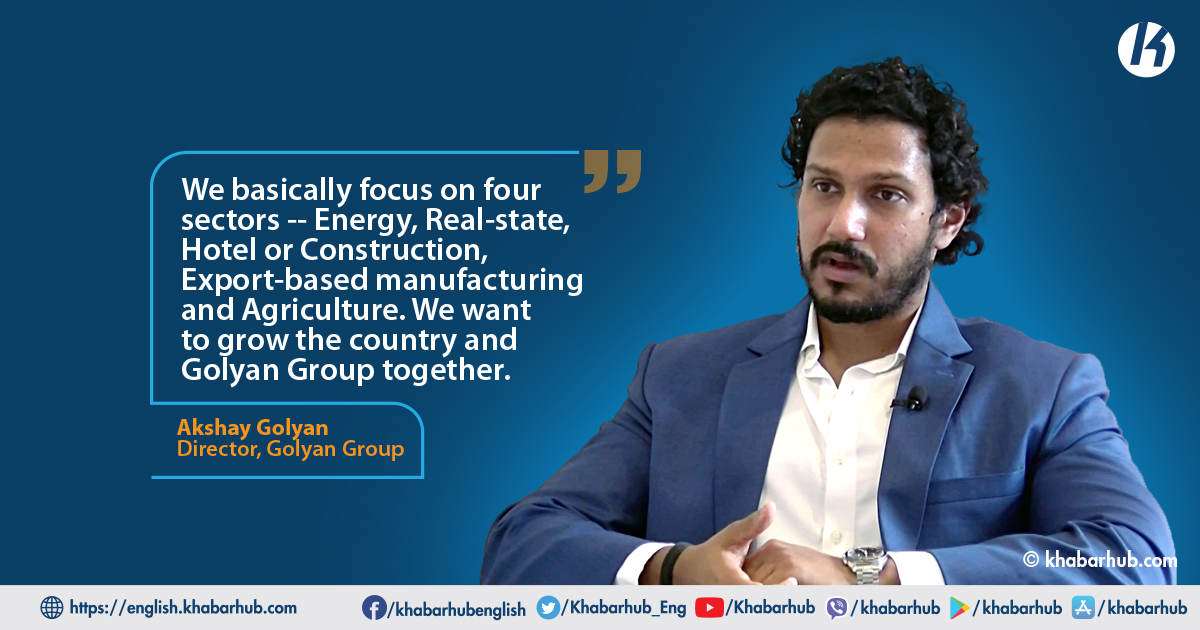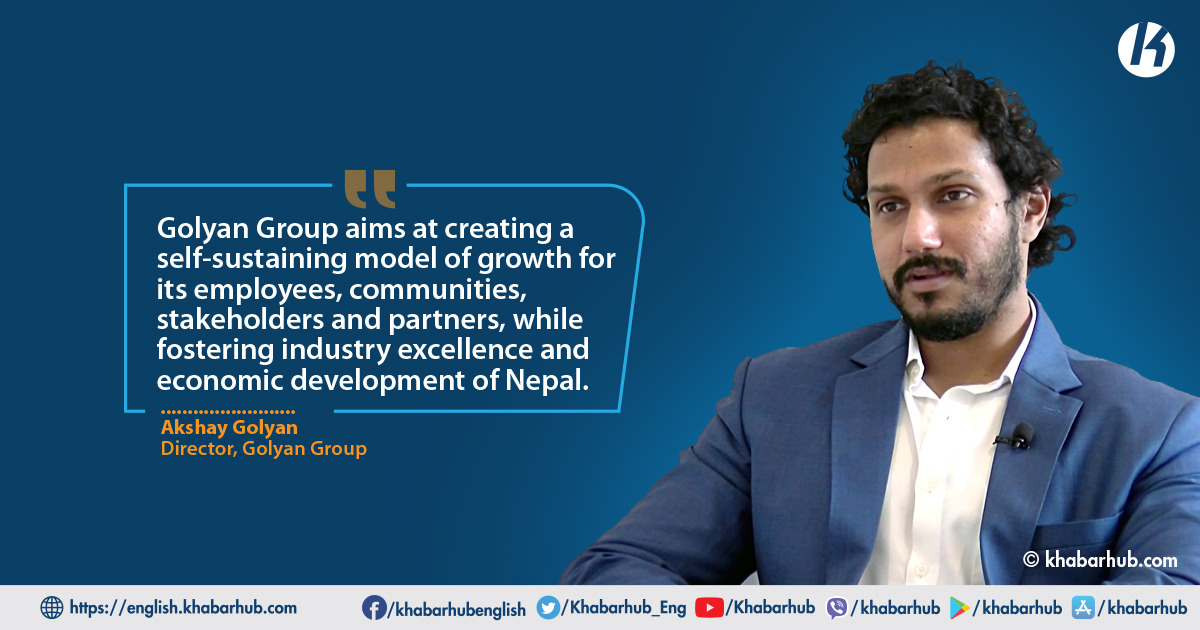Akshay Golyan, the Executive Director of Golyan Group — a leading private sector enterprise headquartered in Kathmandu – shares his vision, mission and goals of his reputed company along with the challenges and opportunities that they had to undergo in the past to ascend to a glorious present.
A 30-year-old enthusiastic and emerging entrepreneur, and a business leader, Akshay currently leads a 5,000 plus workforce. He believes in striving to strengthen the country’s economic and social foundations to ensuring a justifiable future.
His incisive articulation in the course of an interview with Khabarhub reflected his dynamism and vigor. The secret of the success of this US graduate and an MBA from Spain lies in his perseverance and allegiance towards his work.
In the course of a guileless conversation, he also talked about the COVID-19 pandemic, its impact on the private sector business, revival of economic activities, his plans, among other issues.
To create a self-sustaining model of growth for our employees, communities, stakeholders and partners, while fostering industry excellence and economic development of Nepal is the Group’s vision. Akshay also very affirmatively spoke his determination to make his company a global conglomerate representing the values, culture, hospitality, and heritage of Nepal.
Golyan Group, Nepal’s reputed business organization, has invested in several sectors including industry, hotel, energy, agriculture, textile, real estate, banks and financial institutions.
His company, the Golyan Group, which has an annual turnover of more than 200 million, has expanded investments in new sectors as well.
Probably the largest exporter from the private sector, it is currently exporting Nepali products to India, USA, the UK, Canada, Germany, Italy, Singapore, Turkey, Kenya and other countries. Excerpts:
As a graduate from the United States and an MBA from Spain, how relevant and applicable do you find your education to implement your vision in a country like Nepal? And, how are you utilizing it for the Group you are currently leading?
In fact, my study abroad has been incredible as it provided me with an opportunity to familiarize myself with the system, the working procedure, and to lead an organization.
It also equipped me with the knowledge and the method I should adopt to lead an organization, and the ideas I can use in building up a strong foundation for the organization. Besides, the diversity and networking opportunity one gets while studying abroad is also amazing when it comes to familiarizing with all traits of life.
You know, we impulsively tend to expose ourselves to diverse cultures, situations and experiences at a time. This, too, helped me to come up with innovative ideas and plans as to how we can develop a suitable model for Nepal.
COVID-19 has brought hardship to people from all walks of life. What major problems is your Group facing because of the pandemic?
Yes, the COVID-19 pandemic has hard-hit all sectors, and our business is no exception. The lockdown or prohibitory orders decelerate the businesses.
Retail shops usually pull down their shutters. Labors in manufacturing industries prefer to remain inside their homes as they are concerned about the safety of their family members. Lockdown or other types of restrictive measures adversely affect the entire business sector.
However, such adverse situations make us come out from the traditional notion of a workplace. After the lockdown for few months last year, we researched how to overcome such situations.
We sought options such as ‘work from home’ or operate remotely without coming together physically, etc. We learned some ways out last year, that’s why it was relatively easier this year.

What tangible measures the government and the private sector need to take to help the pandemic struck economy recuperate?
The easier and safer measure to be taken at this time is vaccination. As the administration of the vaccine to all people is the only thing that can help in bringing everything back to normalcy, both the private and government mechanisms have to be activated collaboratively to make vaccination possible at the earliest.
As the public health experts are talking about the possibility of third and fourth waves and new mutations of the coronavirus, the only way to resolve the crisis induced by coronavirus is vaccination.
To help Nepal overcome the long-term impact of the coronavirus pandemic, to empower the private sector, and to make them increase their investment in the country, what can be the primary initiatives that the private sector has to take?
In this regard, I suppose, the private sector and government should join hands and find out feasible solutions. Giving incentives for some time or offering tax holidays can be something to think about.
The budget this year has some encouraging plans for start-up entrepreneurs. However, we have to see whether it goes implantable for the plans or policies that are not put into implementation are useless.
So, both the private sector and the government should work collaboratively to help those plans be implemented.
As a business leader representing the new generation, what new investment plans have you come up with?
There is nothing absolutely new to talk about, but, in our Group and the companies under it, what I encourage is working with a system, procedures and in an organized way.
This will ensure a comfortable environment for both our employees, staffers, and stakeholders. We particularly focus on a transparent way of working.
The private sector that had been operating in the traditional way has adopted digitalization of late. How has this affected you especially in improving your performance?
The private sector, especially, the business community had not been much updated in the information technology sector till the last five or six years. Its progress had been very sluggish.
However, the lockdown and prohibitory orders that were enforced to curb and control the coronavirus pandemic somehow pushed us to digitalization more swiftly, esp. the arrival of e-wallet or e-banking.
The use of SEP and software in the private sector has significantly increased in recent times. Digitalization has to be welcomed by all as it enhances both efficiency and productivity.
Although Nepal is an agricultural country, it is dependent on other countries for agricultural products. What do you think is the reason behind it?
I definitely think it is due to the low production. India seems to have focused on mass production, but in our country, the production has been declining in the last 10-15 years. It’s mainly due to the cost of production and the market.
The middlemen who play between the farmers and the sellers are causing the surge in market price. For example, the price of potatoes and onion imported from India is relatively less than those produced in Nepal. The main cause for it is the high cost of production. The solution lies in reducing the cost of production.
In India, the farmers get the price they deserve since the government buys products from them. Here also, if we make a similar system, the cost of production can be minimized.

Golyan Group has joined the agricultural sector in Nepal by opening a non-profitable Golyan Agro Company. What prompted the Group to join this sector? How is your company doing now?
It’s all because of my father’s initiation and determination. My father’s dream had been, for more than the last five or six years, promoting the agricultural sector of Nepal.
Every time he visited the village and met the farmers, he used to feel inspired by their hard work and used to wonder why we are still heavily dependent on the import of the goods when we have such a large potential in the country. In the 1960s or 70s, while he was in Biratnagar, he enjoyed the local products.
The taste and the quality of the food then, as he said, were superb (smiles). This made him think of doing something worth for the agriculture sector that has such a high potential.
Another factor is our desire to see Nepal becoming less dependent on others; at least in the goods and items that can be produced locally.
Regarding your question about the condition of our Agro Company, it’s not so comfortable yet. We faced hard times in the initial days due to the pandemic. We are learning and growing gradually. We are optimistic we can contribute better.
The trade deficit is increasing every year. The volume of imports is more than the goods we export. Yours is one of the Groups involved in the export of goods. As one of the key exporters, what are your suggestions to reduce the trade deficit?
The government seems slightly concerned about the issue now. Most of the suggestions in such issues might sound too theoretical, yet we have to mention them.
The first thing we have to think about for reduction of trade deficit is to make the products competitive. Being a landlocked country, we have not been able to compete with other countries in terms of logistic cost and transportation cost.
Provided the government takes some initiation, we can address this issue. To enhance export, it is equally important to discourage imports.
For example, if we reduce the cost of production in agriculture and reduce the logistic cost, our products can be circulated throughout the country.
We have an immense market within the country as well. If we managed to meet the internal needs from our products, obviously, our burden of import decreases. Moreover, we can also export our goods at a competitive price.
Let us talk about the real-estate sector. Golyan Group has invested in the real-estate sector as well. How is this business now?
Concerning our investment in real estate, we have currently two projects in housing. Both are complete now. In Balkumari, we have constructed 212 apartments.
Most of the apartments have been sold out. Another project is high-quality super-premium apartments in Soltee Mode. Regarding our future project, we have got a ten-storied commercial building at Baneshwor, which will be complete in September-October of 2022. The construction is ongoing. But, the pandemic has disrupted the work.
We have another housing project in the planning phase at Teku – a residential project of 95 apartments, which will be complete in three years.
The housing sector has not been organized in Nepal yet. Many people still regard the real-estate sector as an unproductive sector. Though the investment is increasing, the sector has not made significant progress. What is your take on this?
Generally all cities regard real estate as a fundamental aspect of development. Land or shelter is one of the four needs of the people. The land is regarded as a fixed asset.
I don’t think it rational to regard this sector as unproductive. It is a productive sector, especially in a city like Kathmandu. The price of land has gone high in Kathmandu. But, there are opportunities in the outskirts of Kathmandu and Terai as well. Kathmandu has a dense population. We’ll continue developing other projects in the suburbs as well.
How is Golyan Group’s investment in the energy sector? What are your plans for the future?
We have projects in the solar as well as hydropower sector. We have a relatively bigger project in hydropower. We have around 200MW under construction. A project of 35 MW will be completed in two to three months. We have around 400MW in the planning phase.
Likewise, a 60 MW project on solar has reached the power purchase agreement (PPA) stage. Out of that, we have already received the draft PPA of 20MW. We will start the construction from Shrawan (Mid-July). This is a Nepalgunj-based project.
How challenging is it?
Relatively, it’s less challenging. The process has been slow in the solar energy sector due to the unstable government.
The clean energy and green energy sector have been getting some attention though. It’s, however, challenging to meet the target. Nepal has set a target to replace all diesel and petrol vehicles in the next 10 to 12 years.
Therefore, the energy sector has better potential from a business perspective as well because energy consumption is sure to grow in the days to come.
Golyan Group has invested in the hospitality sector as well. How is it going?
Honestly speaking, the hospitality industry has been close to zero at present.

How was it before lockdown?
Before the lockdown, everything seemed promising. The hotels were being booked. The hospitality industry was prospering.
That’s why we ventured into this sector as well. But since last year, due to the pandemic, tourism has drastically declined.
Yet, we are hopeful that once the prohibitory orders are lifted and the vaccination is possible worldwide, this sector will return to normalcy. I am optimistic that this sector, too, would revive in the next two years.
What prospects of the hospitality and hotel sector do you see once the COVID-19 crisis is over?
Yes, after 3 months to 3 years of the COVID-19 induced crisis, all sectors will do well. I am quite optimistic.
Since people have been confined at home for more than one and half years, they will definitely look for entertainment and refreshment. They will look for some travel. They will look for some fun. So I hope it will go well.
Let’s talk about your plans. What sectors is Golyan Group planning to invest or manage in the days ahead?
Our main focus now is in four sectors: Energy, Real-state, Hotel or construction, export-based manufacturing and agriculture. We are working on how to value add in these four sectors. We want to grow the country and Golyan Group together.
Out of these four sectors, which sector do you find most challenging?
Of course, it’s agriculture, which is difficult anywhere in the world. In the context of Nepal, the lack of technology has made it even worse. In addition, the private sector does not have good knowledge of agriculture. I mean, the private sector does not have much experience and know-how.
This has been a challenge compared to other industries. Yet, we are learning, and, hopefully, in three or four years, agriculture will be our number one business.
How about Golyan Group expanding its span at the international level?
We do not have any plan to go internationally. First, we want to bring substantive changes here in Nepal. When Nepal will go to the international level, we will go international together with Nepal.
What are your tips for start-ups and entrepreneurs of new generations?
Spend enough time in planning and homework; and do not jump into anything or everything without sufficient research and planning. I would just ask to work hard, yet, remember that, the reward might not be in your hands all the time.
As we take on new challenges, we, at the Golyan Group, understand that working sustainably is more important. Hence, it’s our constant endeavor to create and maintain a balance between resource management and economic advancement throughout our current and future businesses.









Comment